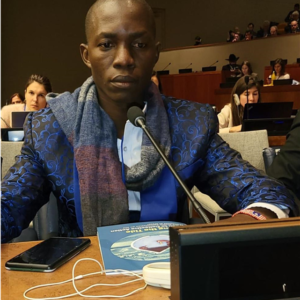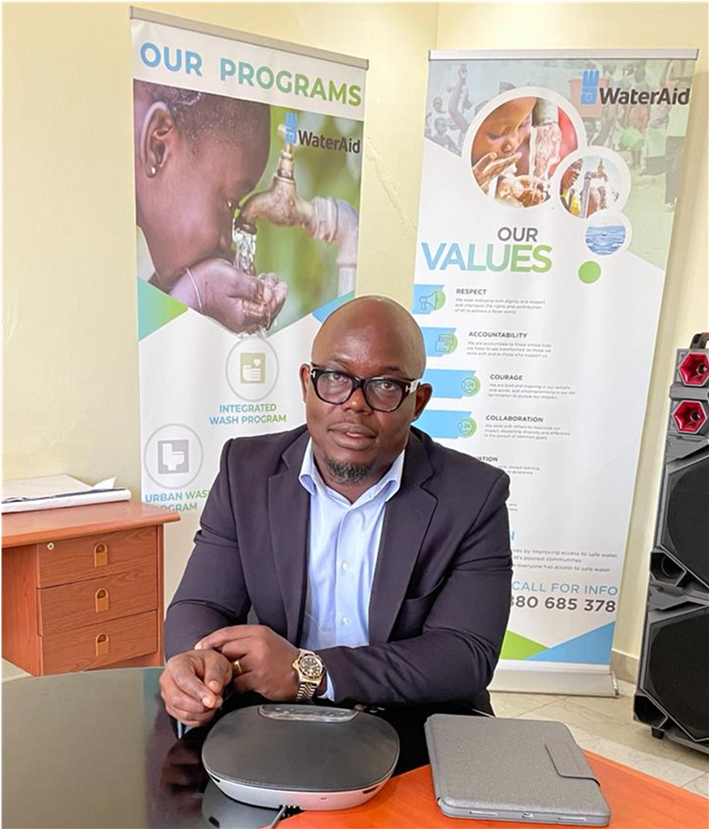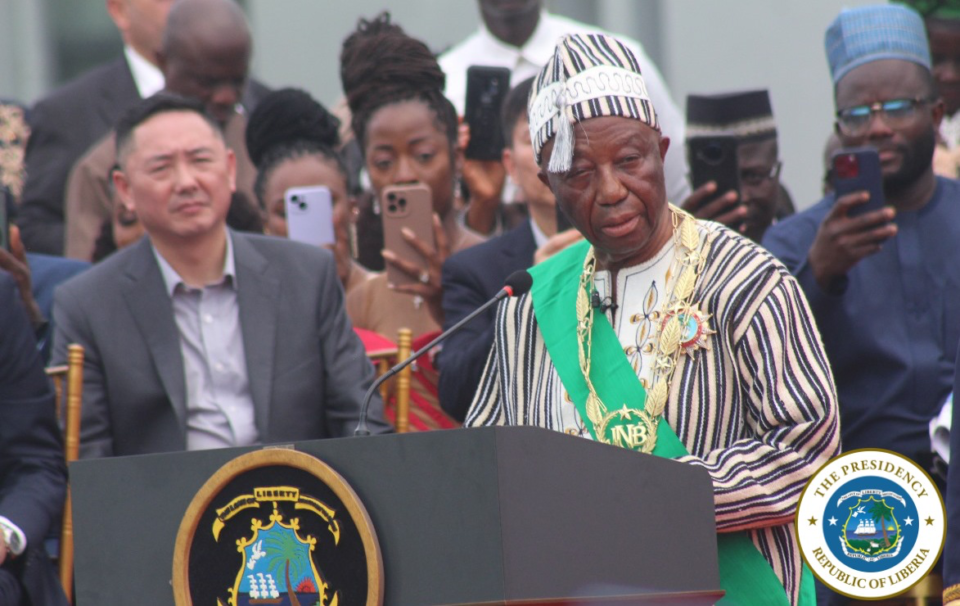PHOTO: Liberia’s President, Joseph Boakai delivering his inaugural speech on January 22, 2024. Credit: Executive Mansion
By Aaron Salloe
MONROVIA, Liberia—On January 22, 2024, Liberia had its second democratic transition in 6 years. In the presence of world leaders, prominent and ordinary Liberians, Joseph Boakai was sworn in as Liberia’s 26th president.
One major highlight of President Boakai’s inaugural speech was a pledge that his government would prioritize Water Sanitation and Hygiene (WASH). Sanitation, a key component of WASH, is a major pillar of his government’s development strategy—Agriculture, Roads, Rule of Law, Education, Sanitation and Tourism (ARREST). ARREST is also referred to as the “Liberia First Agenda,” which seeks to make WASH “a priority.”
Although at the heart of Liberia’s growth and development, the WASH sector was less funded by the immediate past government. The government headed by Nobel Peace Laureate, Ellen Johnson Sirleaf, for which Mr. Boakai served as Vice President for 12 years between 2006-2018, made some strides with WASH, including establishing the Liberia WASH Compact and setting up a framework for the WASH Commission. Madam Ellen Johnson Sirleaf who was Liberia’s president and Mr. Boakai’s boss for those 12 years, also served as WASH Goodwill Ambassador for Africa. Now heading his own government, Mr. Boakai has made no secret of his intention to prioritize WASH.
And on day one in office, he showed a renewed vigor, focus, and determination to reawaken the WASH sector, which experts firmly believe holds the key to the survival, safety, and well-being of citizens and foreigners alike.
The President’s pledge to prioritize the WASH sector couldn’t have come anytime sooner than now, with nationally, 23 percent of the population having access to at least basic sanitation in Liberia, while nationally 35 percent of the population practice open defecation, according to the Joint Monitoring Program (JMP), 2022. The Joint Monitoring Programme for water supply and sanitation by World Health Organization (WHO), and the United Nations Children’s Fund (UNICEF), is the official UN mechanism tasked with monitoring progress towards SDG 6.
“We view sanitation as a major area of concern because it relates to our public health system and directly impacts efficient workforce development and deployment,” said President Boakai.
The President acknowledged that the health of Liberia’s population of more than 5.1 million was at risk. “The lack of safe drinking water and proper garbage and sewage disposal systems has exposed millions of Liberians and residents living in congested cities, towns, and rural communities to diseases and other health risks,” said President Boakai.
“Given the inequities in an already inadequate healthcare delivery system, exposure to poor hygienic practices is a national developmental risk. As our interconnected world is making us increasingly mutually vulnerable to pandemics, addressing the challenges of sanitation and health care will be a major priority of our government.”
“Although the prevalence of HIV/AIDS is relatively low, malaria, acute respiratory infections (ARI), diarrheal disease, and tuberculosis account for about 65% of all deaths in Liberia,” according to a 2021 Water Sanitation Hygiene and Nutrition Policy Gap report.
Funding for the sector is critical, as it could help address the numerous problems facing the sector, including open defecation and the lack of access to pure and safe drinking water among others. WaterAid is “committed to working with the GOL and other stakeholders to increase WASH financing from current levels of US$37 million per annum to around “US$50 million per annum.”
Direct government support to the sector may have dropped in the past six years, but there’s been a surge in donors’ support—including two projects supported by the United States Agency for International Development (USAID)—the Improved Access to Safe Drinking Water Activities in Liberia, a five-year project that plans to move Liberians in Montserrado and Margibi counties to a basic level of water services by strengthening water sector governance, and the five-year Countywide Sanitation Activity (CWSA) in Liberia project that aims to end open defecation and achieve universal adoption of basic sanitation throughout five counties Lofa, Bong, Nimba, Montserrado and Grand Bassa. The two projects seek to provide affordable and accessible WASH services.
According to the WaterAid Liberia Country Programme Strategy 2023-2028, “US$120 million would be needed per year for five years to successfully implement the National WASH Strategy.” It is noted that the document, which expired in 2017, still remains relevant.
A week after his inaugural address, President Boakai addressed Liberia’s 55th Legislature on January 29, 2024—repeating his administration’s plans for WASH and recognizing that “health and sanitation remain a major priority for our government”—pledging to “improve sanitation.”
The President’s two speeches summarized Liberia’s WASH problems. They underscored the critical and urgent need to boost or improve the sector in a country where 1.3 million “don’t have clean water close to home,” according to a JMP, Liberia 2021 WHO/UNICEF joint monitoring program for water supply, sanitation and hygiene.
The report said, “More than three-quarters of the population still don’t have a decent toilet of their own, and many have to go outside instead.”
Liberia’s WASH problems are well documented and highlighted in numerous experts’ reports. The country does not make the list of countries that use water effectively, according to the Africa Renewal, a UN print and online site dedicated to WASH issues in Africa.
Although Liberia does not make a WHO’s list of countries with high WASH-related mortality rates, it’s on a list of “critically water-insecure countries in Africa,” according to the same site.
Liberia is miles away from achieving goal six of the United Nations Sustainable Development Goals (SDGs), which calls for providing “Access to safe water, sanitation and hygiene is the most basic human need for health and well-being,” by 2030 said, Chuchu Selma, Country Director for WaterAid.
“To end WASH poverty in Liberia, there must be strong and committed people and leaders who will invest in and support the provision of WASH services, adopt and sustain positive WASH behaviors,” continued Mr. Selma.
Pro-WASH campaigners continue to worry about problems in the sector. One of them is the United Youth for Peace Education Transparency and Development in Liberia (NYPETDL), headed by National Executive Director, Timothy Kpeh. Established in 2009, the organization has successfully spearheaded numerous campaigns to support WASH, including the endorsement of the Liberia WASH Compact, the establishment of the National Water Sanitation and Hygiene Commission (NWSHC), and the Legislative WASH Caucus. The organization has also successfully advocated for direct government budgetary support to WASH.

Mr. Timothy Kpeh, National Executive Director, United Youth for Peace, Education, Transparency and Development in Liberia. Credit: Timothy Kpeh
“The WASH situation in Liberia is a serious national crisis that demands strong government commitment,” said Pastor Kpeh. Liberia’s WASH sector is excessively dependent on external aid. To achieve the SDGs, the country must spend five times more than it does today in order to get the nation out of the current WASH crises.”
Kpeh and other WASH sector leaders expressed hope the Boakai administration will fulfill its promise on WASH.
“While I recognize the President’s intention to include WASH in his development agenda, the need to go beyond the policy and ensure full implementation is key,” said Kpeh.
Speaking from the WaterAid offices in Monrovia, Mr. Selma said the WASH situation is concerning and would like the Boakai administration to pay keen attention attention to it.
“They must prioritise and adequately invest in, model and replicate WASH interventions,” said Selma. “And ensure that WASH is integrated into health policies, programmes and practices for better public health outcomes.” Mr. Boakai said his government would invest in the sector.

Mr. Chuchu Selma, Country Director, WaterAid Liberia. Credit: Mr. Chuchu Selma
“We will invest and partner with others to improve the provision of safe drinking water, basic hygiene practices,” said President Boakai in his annual message. The President also pledged that his government would provide “related and affordable healthcare delivery services for our people, especially children and the vulnerable of our population.”
The President’s pledge has engendered hope and enthusiasm among partners that the sector can rise again, be treated with care and concern, and generate the much talked about support it truly and desperately needs. WASH actors are hopeful that funding to the sector would increase under Mr. Boakai’s administration and WASH will be an immediate priority of the government’s first “100-day Deliverables.” WASH is everyone’s business.
Therefore, it’s incumbent upon all: citizens, advocates, leaders of the sector, politicians, policymakers, and donors to take concrete and positive steps or actions to improve the WASH sector, including ensuring a safe and proper disposal of human feces, practicing of regular hand washing methods, and proper treatment of safe drinking water to reduce diarrhea, among others.

